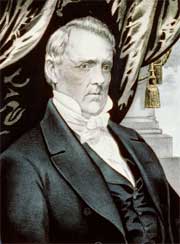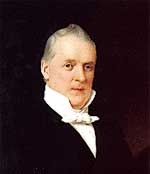| James Buchanan, the fifteenth President of the United States (1857-61) was born in Mercersburg, Pennsylvania on April 23, 1791. As a young man he had a tragic love affair, and he remains the only Chief Executive who never married. Even so, he had a reputation as a lady's man. Buchanan stood over six feet tall, had broad shoulders, and a portly, dignified bearing.

Buchanan was, by nature, a peacemaker who tried to bring the various factions of the Democratic Party together. During his forty-two years of political service, he served twice in the Pennsylvania General Assembly; served one term in the United States Congress, was United States Minister to Russia; was a United States Senator, was James Polk's secretary of state, and was the United States Minister to Great Britain. Along with other United States ambassadors he signed the Ostend Manifesto, which said the United States could take Cuba by force if the purchase of Cuba failed.

 Buchanan was liked by northern Democrats and southern moderates alike, but it was the Democrats who nominated him for President 1857. He ran on a platform promoting the rights of settlers in the various US territories to decide for themselves whether or not to sanction slavery. He was sixty-six years old when he was elected. Two days before he was inaugurated, the United States Supreme Court decided that the Constitution protected slavery in all territories. Buchanan was liked by northern Democrats and southern moderates alike, but it was the Democrats who nominated him for President 1857. He ran on a platform promoting the rights of settlers in the various US territories to decide for themselves whether or not to sanction slavery. He was sixty-six years old when he was elected. Two days before he was inaugurated, the United States Supreme Court decided that the Constitution protected slavery in all territories.
Buchanan held office during the important years immediately preceding the Civil War. Personally, he was against slavery, viewing it as morally wrong; but he firmly believed that the Constitution protected it, and he considered it his duty to support it publicly. On that basis, he supported the admission into the Union of Kansas, a slave state. This caused conflict in the Democratic Party, and Buchanan was caught in the middle.
He'd supported the Compromise of 1850, which stated that there would be maintained a balance of Senate seats between slave and free states. During the secession crisis, he declared that secession was illegal while trying to soothe the Southern states. His attempts at reconciliation failed dismally. His refusal to take a strong stand against slavery angered the North, and his stance against secession made him unpopular with southerners. When push came to shove, however, he refused to forcefully stop seven of the fifteen slave states from seceding from the Union. He delayed the Civil War until Abraham Lincoln became the next chief executive.
 In 1859 the split within the nation was further polarized when an abolitionist named John Brown led a raid against the arsenal at Harper's Ferry. The confusion demoralized a nation and further fractured the Democratic Party, already weakened by the compromises and waffling of several administrations around the issue of slavery. The country began to brace itself for the biggest challenge in its history -the War Between the States. In 1859 the split within the nation was further polarized when an abolitionist named John Brown led a raid against the arsenal at Harper's Ferry. The confusion demoralized a nation and further fractured the Democratic Party, already weakened by the compromises and waffling of several administrations around the issue of slavery. The country began to brace itself for the biggest challenge in its history -the War Between the States.
During his term as President, the Pony Express began carrying mail across the continent; the Atlantic telegraph cable linking the European and North American continents was laid, and treaty and trade agreements were negotiated with China.

After his term of office, Buchanan retired to his home near Lancaster, Pennsylvania, where he supported the Union cause until his death in 1868. Abraham Lincoln, a Republican, took over the weighty responsibility as President during the impending War.
|

